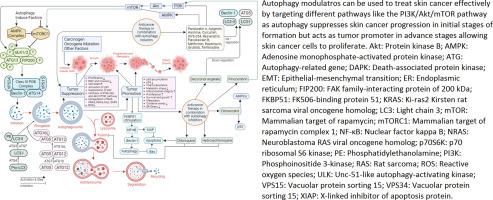Autophagy as a targeted therapeutic approach for skin cancer: Evaluating natural and synthetic molecular interventions
IF 2.8
引用次数: 0
Abstract
Skin cancer, a prevalent malignancy worldwide, poses significant health concerns owing to its increasing incidence. Autophagy, a natural cellular process, is a pivotal event in skin cancer and has advantageous and detrimental effects. This duality has prompted extensive investigations into medical interventions targeting autophagy modulation for their substantial therapeutic potential. This systematic review aimed to investigate the relationship between skin cancer and autophagy and the contribution and mechanism of autophagy modulators in skin cancer. We outlined the effectiveness and safety of targeting autophagy as a promising therapeutic strategy for the treatment of skin cancer. This comprehensive review identified a diverse array of autophagy modulators with promising potential for the treatment of skin cancer. Each of these compounds demonstrates efficacy through distinct physiological mechanisms that have been elucidated in detail. Interestingly, findings from a literature search indicated that none of the natural, synthetic, or semisynthetic compounds exhibited notable adverse effects in either human or animal models. Consequently, this review offers novel mechanistic and therapeutic perspectives on the targeted modulation of autophagy in skin cancer.

自噬作为皮肤癌的靶向治疗方法:评估天然和合成分子干预措施
皮肤癌是一种全球流行的恶性肿瘤,由于其发病率不断上升,对人们的健康造成了极大的威胁。自噬是一种自然的细胞过程,在皮肤癌中起着关键作用,有利有弊。这种双重性促使人们广泛研究针对自噬调节的医疗干预措施,以挖掘其巨大的治疗潜力。本系统综述旨在研究皮肤癌与自噬之间的关系,以及自噬调节剂在皮肤癌中的作用和机制。我们概述了以自噬为靶点作为皮肤癌治疗策略的有效性和安全性。这篇综合综述发现了一系列具有治疗皮肤癌潜力的自噬调节剂。这些化合物中的每一种都通过已详细阐明的不同生理机制显示出疗效。有趣的是,文献检索结果表明,这些天然、合成或半合成化合物均未在人体或动物模型中表现出明显的不良反应。因此,本综述为有针对性地调节皮肤癌自噬提供了新的机制和治疗视角。
本文章由计算机程序翻译,如有差异,请以英文原文为准。
求助全文
约1分钟内获得全文
求助全文
来源期刊

Cancer pathogenesis and therapy
Surgery, Radiology and Imaging, Cancer Research, Oncology
CiteScore
0.80
自引率
0.00%
发文量
0
审稿时长
54 days
 求助内容:
求助内容: 应助结果提醒方式:
应助结果提醒方式:


